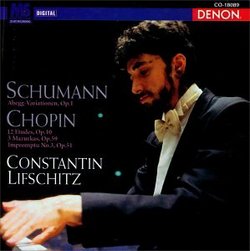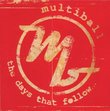| All Artists: Frederic Chopin, Robert Schumann, Konstantin Lifschitz Title: Abegg Variations / 12 Etudes / 3 Mazurkas Members Wishing: 0 Total Copies: 0 Label: Denon Records Release Date: 9/28/1999 Genre: Classical Styles: Chamber Music, Forms & Genres, Etudes, Historical Periods, Classical (c.1770-1830) Number of Discs: 1 SwapaCD Credits: 1 UPC: 795041808929 |
Search - Frederic Chopin, Robert Schumann, Konstantin Lifschitz :: Abegg Variations / 12 Etudes / 3 Mazurkas
 | Frederic Chopin, Robert Schumann, Konstantin Lifschitz Abegg Variations / 12 Etudes / 3 Mazurkas Genre: Classical
|
Larger Image |
CD DetailsSimilar CDs |
CD ReviewsLifschitz rewrites the book on the Etudes 10/21/2001 (5 out of 5 stars) "The "music fan from Cologne" makes two points about Lifschitz's performance of Chopin's Opus 10 Etudes. They are -- in reverse order -- that the 20-year-old Russian (Lifschitz's age when the recording was made in 1997) "doesn't have the fingers" for the Etudes, and that he plays them as if he was not familiar with the versions of Ashkenazy, Pollini, Berezhovsky and those of a few others. The remark about Lifschitz's technique is patently off the mark. This is playing of precise articulation, elegance and refinement that only a handful of other pianists could match. There is the floating joie de vivre of Lifschitz's arpeggios in No. 1; the carefree accuracy of the last three fingers of his right hand in No. 2; the unearthly legato of his phrasing in No. 3. One could go on.
But the man from Cologne does raise an interesting point when he suggests that that Lifschitz's Etudes are like nobody else's. What Lifschitz has done is nothing less than to rewrite the book about how the Etudes can be played. His performances of the Etudes do not always have the exhilarating sweep featured in performances by such pianists as Ashkenazy (particularly in his first recording on BMG) and Pollini (DG). But bravura excitement is not lifschitz's primary focus. Only Ignaz Friedman (1882-1948) and Sviatoslav Richter have played the Etudes with such complete mastery of their contrapuntal writing. In Lifschitz's hands, the C-sharp Minor Etude (Opus 10, No. 4) is more than an impassioned outburst; it is also a two-part invention in which the listener is more aware than is usually the case of the contributions of the alternating hands. The C Major Etude (Opus 10, No. 1) does more than contrast compound arpeggios against sustained bass notes; in its admirably light and clear textures, it also has the harmonic sureness of a Bach prelude. And in quieter, more relaxed etudes -- such as the E-flat Minor Etude (Opus 10, No. 6), with its melodic restlessness and yearning -- Lifschitz can make a listener aware of things he never even knew were there. This recording of Chopin's Opus 10 deserves an honored place alongside the greatest of its predecessors." |

 Track Listings (17) - Disc #1
Track Listings (17) - Disc #1
